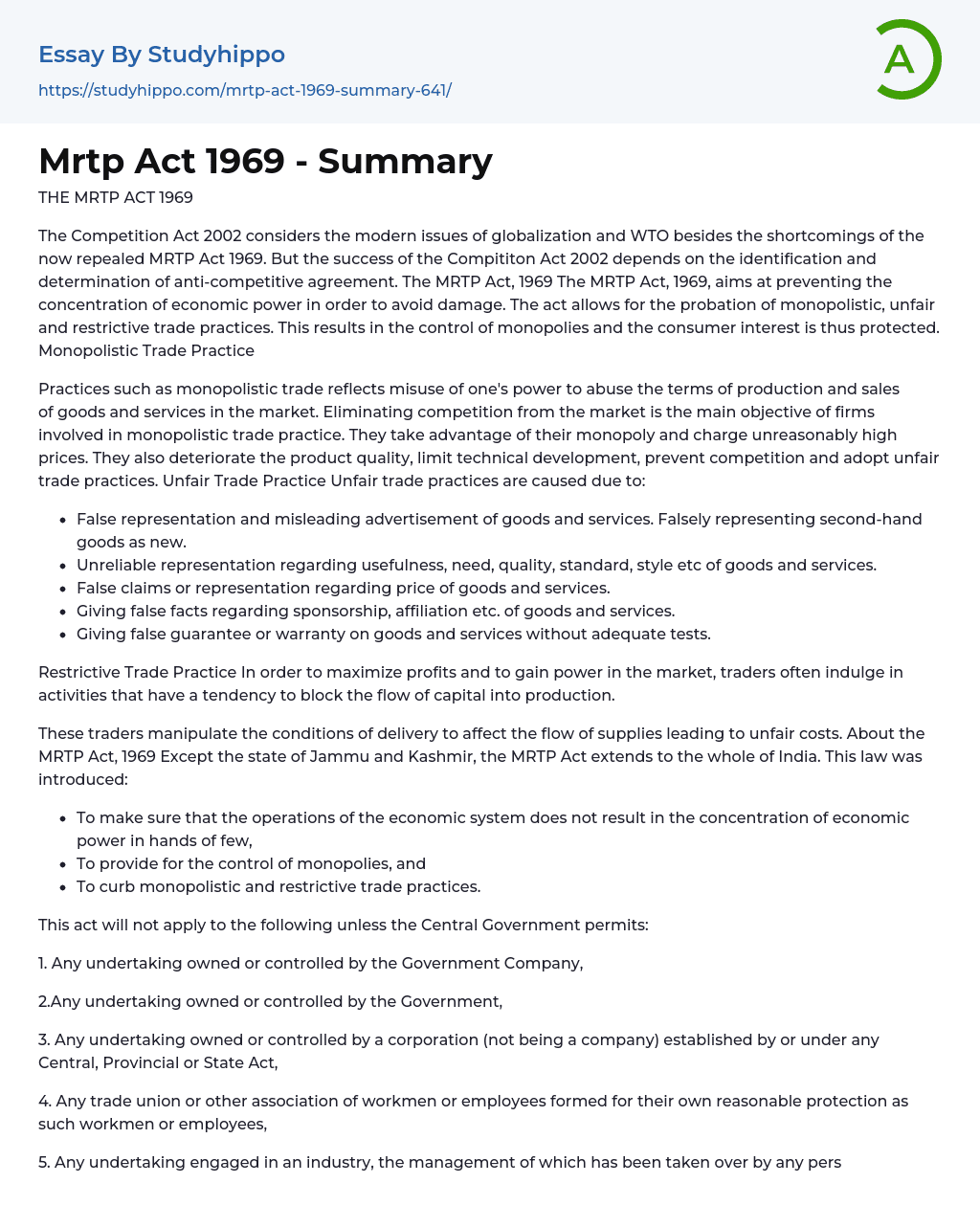The Competition Act 2002 takes into account the contemporary concerns of globalization and the World Trade Organization (WTO) as well as the deficiencies of the previously repealed MRTP Act 1969. However, the effectiveness of the Competition Act 2002 relies on accurately identifying and resolving anti-competitive agreements. The MRTP Act, 1969 had the objective of preventing the accumulation of economic power to prevent harm. It authorized the prohibition of monopolistic, unfair, and restrictive trade practices, leading to regulation of monopolies and protection of consumer interests.
The misuse of power in monopolistic trade practices involves the abuse of production and sales terms in the market. The main goal of firms engaged in monopolistic trade is to eliminate competition by taking advantage of their monopoly and charging excessively high prices. Furthermore, they harm product quality, impede technical progress, suppress competition, and adopt unfair trade practices.
Unfa
...ir trade practices arise from these actions, including false representation and misleading advertisements for goods and services, labeling second-hand goods as new, providing unreliable information about usefulness or quality, making false claims about prices, falsely stating sponsorship or affiliation, and offering false guarantees or warranties without proper testing.
Traders engage in restrictive trade practices to maximize profits and gain market power. These activities hinder capital flow into production by manipulating delivery conditions and leading to unfair costs.
The MRTP Act of 1969 applies to all of India except for Jammu and Kashmir. Its purpose is to prevent economic power concentration and regulate monopolies and restrictive trade practices. However, it does not apply to government-owned or controlled undertakings unless granted permission by the Central Government.
The MRTP Commission regulates any enterprise owned or controlled by a corporation (excluding
company) established through any Central, Provincial or State Act, as well as any trade union or other association of workers or employees formed for their own protection. It also includes enterprises involved in industries whose management has been taken over by any person or group under powers granted by the Central Government, cooperative societies formed and registered under any Central, Provincial or state Act, and financial institutions. The Monopolies and Restrictive Trade Practices Commission is responsible for overseeing monopolies and restrictive trade practices.
The commission consists of a Chairman and 2 to 8 more members, all chosen by the Central Government. The duration of each member's term is decided by the Central Government and should not surpass 5 years. Nevertheless, reappointment is possible for members.
Complaints regarding unfair trade practices, monopolistic trade practices, or restrictive trade practices can be lodged with the MRTP commission. The process for lodging a complaint involves:
- An individual consumer or a registered consumer organization has the right to file the complaint.
- The Director General of the MRTP commission carries out an investigation to gather information about the case.
- If there is no prima facie case, the complaint is dismissed. If it is considered valid, an appropriate order is issued.
- The commission utilizes temporary injunctions to limit and prevent further engagement in such practices by the party involved.
- In the end, a final order is issued, and the complainant may be eligible for compensation for their losses.
- Federal government essays
- Armed Forces essays
- Confederate States Of America essays
- Federal Government Of The United States essays
- Fourteenth Amendment To The United States Constitution essays
- Governance essays
- Parliament essays
- Politics essays
- Jurisdiction essays
- Bureaucracy essays
- Separation Of Powers essays
- Congress essays
- President essays
- United States Congress essays
- Non-Commissioned Officer essays
- Appeal essays
- Revenge essays
- Corporate Governance essays
- Public Service essays
- Income Tax essays
- Supply essays
- Red Cross essays
- Democracy essays
- State essays
- Liberty essays
- Absolutism essays
- Reform essays
- Republic essays
- John Marshall essays
- Bourgeoisie essays
- Developed Country essays
- Elections essays
- International Relations essays
- Left-Wing Politics essays
- Monarchy essays
- Political Corruption essays
- Political Party essays
- Political Science essays
- Sovereign State essays
- United Nations essays
- World Trade Organization essays
- Contras essays
- Dictatorship essays
- Foreign policy essays
- Monarch essays
- Corruption essays
- Foreign essays
- Democratic Party essays
- European Union essays
- President Of The United States essays




